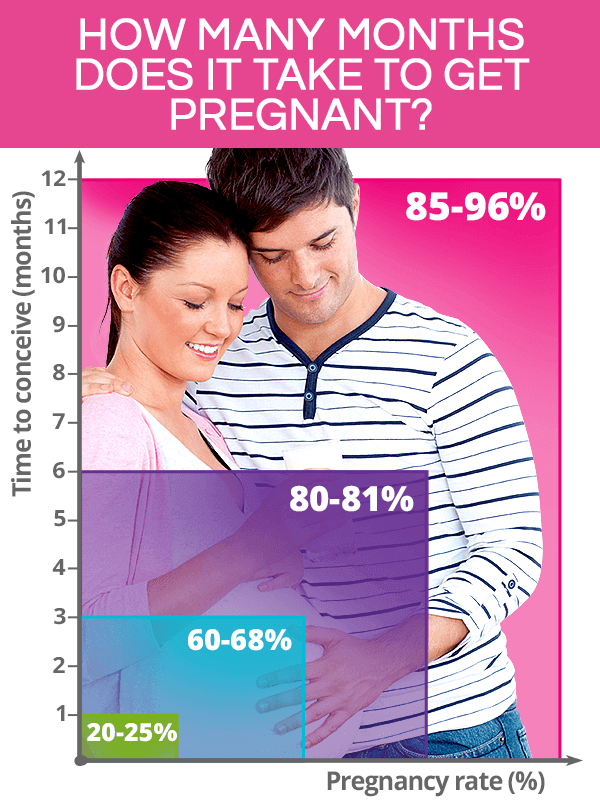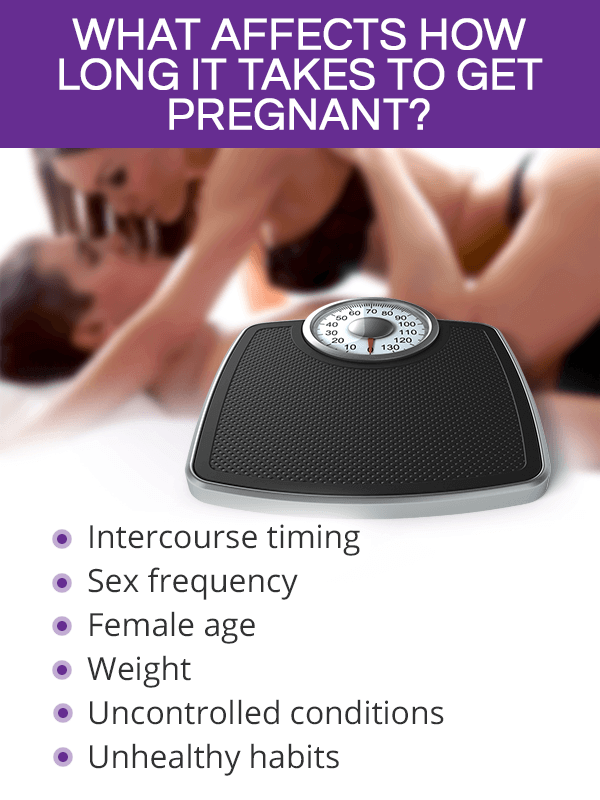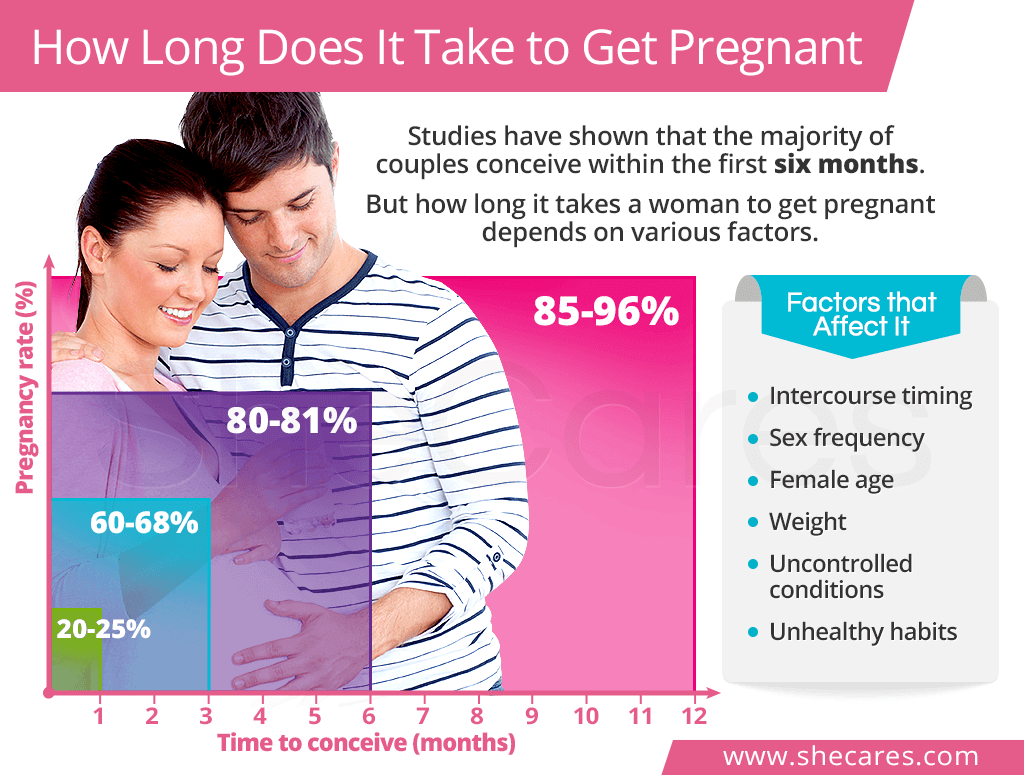How Many Months Does it Take to Get Pregnant?

Before discussing how long does it normally take to get pregnant, it is important to remember that every couple's fertility depends on multiple factors, and their journey to parenthood will differ from that of other couples.
Women Younger than 35 Years of Age
Throughout women's 20s until their mid-30s, they have the best chances of conceiving.
As such, the following statistics are given for healthy women younger than 35 having regular sex (defined as one that occurs every two to three days) without the use of birth control:
- 20-25% couples get pregnant within the first month (one cycle)
- 60-68% couples get pregnant within three months (three cycles)
- 80-81% couples get pregnant within six months (six cycles)
- 85-96% couples get pregnant within one year (12 cycles)
As is clear from this data, most couples do not conceive at first try. It is much more common to take six months to get pregnant as 8 out of 10 couples succeed within that time frame.
It is perfectly normal for a young and healthy couple to spend a full year to fall pregnant. After 12 months, most couples do successfully conceive, and only a small percentage of aspiring parents will require infertility assistance.
Women 35 and Older
The answer to how long will it take to get pregnant after 35 is more complicated as fertility begins to decline at faster rates due to a depleting number of eggs and higher proportions of genetic abnormalities within them.
Generally, women in mid-to late 30s still have good rates of pregnancy with about 78% succeeding within a year.
After 40, however, chances for natural pregnancy decrease by 10% every two years.
In early 40s, there is a 40% chance of conceiving naturally per year, though - with higher miscarriage rates - getting pregnant usually takes longer.
Past45, there aren't many eggs left in the ovaries, and most are abnormal. After entering the menopausal transition, it becomes virtually impossible to get pregnant using one's own eggs.
What Affects How Long It Takes to Get Pregnant?

From a physiological perspective, getting pregnant is a complex and timely orchestrated process going far beyond mere intercourse. How long does it usually take to get pregnant most commonly depends on the following factors:
Intercourse timing. Though fertilization can only occur during ovulation, women enter their fertile window about five days prior to ovulation day. Surprisingly, about half of all couples trying to conceive do not accurately time having sex with a woman's fertile days.
Sex frequency. Many aspiring partners also do not have sex frequently enough, which - along with poor timing - puts them at risk of missing the fertile window, thus delaying getting pregnant.
Female age. How long does it take to conceive a child hugely depends on a woman's ovarian reserve, which is the quantity and quality of her eggs that can be potentially fertilized. Because fertility and age are closely connected, those women trying to get pregnant past their mid-30s will take longer to conceive.
Weight. Both excessive and insufficient body fat percentage are famously linked to ovulation problems that are behind infertility. Studies have shown that getting closer to a healthy body mass index (BMI) even by 5% can often be enough to restart ovulation and enable faster pregnancy.
Unhealthy habits. Maternal addictions to smoking, alcohol, and excess caffeine are one of the most important factors lowering her chances of conception as well as heightening her chances of pregnancy complications if pregnancy was to take place.
Maternal health. Having uncontrolled health conditions before getting pregnant, such as endometriosis, polycystic ovary syndrome (PCOS), or thyroid disease, has an enormous influence on how long does it take a woman to get pregnant.
It is important to mention that male factors, such as age, sperm health, or stress, also have an important role in getting pregnant.
Improving How Quickly Can You Get Pregnant

The best approach a couple can adapt is to not let the statistics intimidate them. Understanding that it takes time to conceive, a couple is more inclined to approach conception efforts more peacefully and proactively.
When trying to increase one's chances of getting pregnant, it is worth keeping in mind the following recommendations that can shorten how long it takes to conceive:
Having frequent and timed sex. Learning how to estimate a woman's most fertile days with ovulation predictors in order to time them with frequent intercourse can dramatically shorten the time to pregnancy. Also, experimenting with best sex positions to get pregnant can make intimacy not only more productive, but also more appealing.
Optimizing health. Taking time to control one's health conditions that might potentially hinder fertility and improving nutrition with a fertility diet can make conception more feasible in a shorter amount of time. Reaching an optimal weight through fertility exercise is another essential step to take
Boosting fertility. Various fertility supplements, including phytoestrogenic supplements, like black cohosh, or hormone-regulating supplements, like Macafem, can give one's overall well-being a healthy boost to get pregnant faster and easier.
Taking care of the mind. Since prolonged stress is capable of inhibiting ovulatory cycles and delaying the time it takes to get pregnant, fertility therapies, such as yoga, meditation, or acupuncture, are a wholesome addition for those preparing to have a baby.
Key Takeaways
It is natural for aspiring parents to want to get pregnant as soon as possible, preferably at first try. When they don't, they are often filled with anxious questions about how long does it normally take to get pregnant and doubts about their reproductive future. Meanwhile, as studies have demonstrated, most couples do not get pregnant within the first menstrual cycle. In fact, up to 80% of partners successfully get pregnant within six months of active trying, and it is expected for healthy, young couples to take up to a year to conceive. Age-related fertility decline, among other factors like intercourse timing or weight, play an essential role in determining how long it takes to get pregnant, a good understanding of which can help couples stay proactive and clear-minded as they are attempting to start a family.
Sources
- Human Reproduction. (2003). Time to pregnancy: results of the German prospective study and impact on the management of infertility. Retrieved February 21, 2019 from https://www.ncbi.nlm.nih.gov/pubmed/12923157
- National Health Service. (2018). How Long Does it Usually Take to Get Pregnant? Retrieved February 21, 2019 from https://www.nhs.uk/common-health-questions/pregnancy/how-long-does-it-usually-take-to-get-pregnant/
- Planned Parenthood. (2010). How long after sex does pregnancy occur? Retrieved February 21, 2019 from https://www.plannedparenthood.org/learn/teens/ask-experts/how-long-does-it-take-for-a-girl-to-get-pregnant-after-having-sex
- PLOS. (2011). Time to Pregnancy: A Computational Method for Using the Duration of Non-Conception for Predicting Conception. Retrieved February 21, 2019 from https://journals.plos.org/plosone/article?id=10.1371/journal.pone.0046544
- Royal College of Obstetricians and Gynaecologists. (2011). Reproductive Ageing (Scientific Impact Paper No. 24). Retrieved February 21, 2019 from https://www.rcog.org.uk/en/guidelines-research-services/guidelines/sip24/


